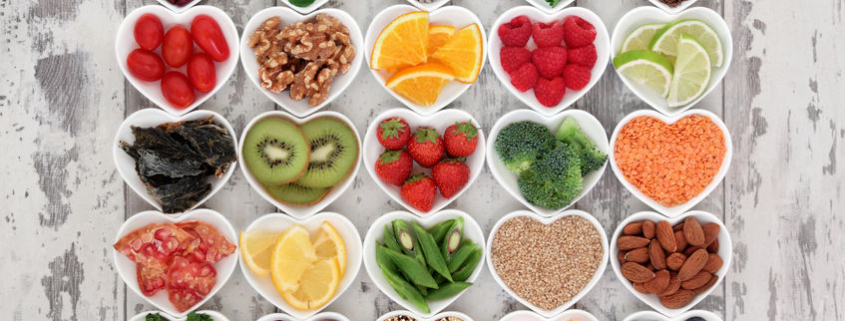Get Well with Food: How nutrition helps you recover
By Stephanie Olzinski, MS, RDN & Nicole Vaudrin O’Reilly, RDN
Proper nutrition helps the body fight infections and heal from surgery or wounds, colds, the flu, COVID-19, and other illnesses and injuries. When your body is going through the healing process, it generally increases the need for calories and specific nutrients. When an illness, like COVID-19, affects appetite, taste, and smell, eating well can be even harder.
Here are recommendations to have a balanced, healthy diet to help your recovery.
Hydrate: Fever, vomiting, and diarrhea can all contribute to dehydration, not to mention being hydrated is helpful for relieving cold symptoms as well. Try to increase how much water you drink. Adults should try to drink eight 8-oz glasses of water every day when they aren’t sick. Adults who are recovering from an illness should drink 3 liters / 100oz / 12 8-oz glasses of mostly water every day. If you really want to help your body, add 1-2 servings of electrolyte drinks, like Pedialyte, Gatorade, or Emergen-C per day to stay hydrated. That can feel like a lot but sipping on small glasses of water every 15 minutes throughout the day can make it easier.
Food Frequency: Small, frequent meals and snacks can help with meeting your increased needs, even when you’re not hungry. Try to eat small, healthy snacks or meals, or drink broth, supplement shakes, or smoothies every few hours.
Protein: Protein is essential for maintaining muscle mass and for building and repairing body tissues. So as your body is healing, you will need more protein. We recommend eating a variety of protein-rich foods like chicken, fish, eggs, dairy, nuts, and seeds. Protein powders or drinks can be helpful if you need to increase your protein, especially if your appetite, taste, and/or smell are impacted because of your illness.
Nutrient-Dense Foods: These are foods that have a lot of vitamins and minerals – important for health. Examples of nutrition-dense foods includes fruits and vegetables, whole grains, fish, lean meat, skinless poultry, peas and beans, and healthy fats like avocado, nuts, and seeds. Nutrition helps when you’re recovering from being sick or injured, so try to eat as many of these foods as you can.
Vitamins and Minerals: Vitamins D, C and E, zinc, and omega-3 fatty acids help your immune system heal from being sick or injured. Taking a daily multi-vitamin with these nutrients can be a good way to have enough but ask your doctor before taking any vitamins or supplements. The best way to get these important vitamins and minerals, though, is in what you eat. Eat as many nutrient-dense foods (listed above) as you can every day – at least 5 servings of fruits and vegetables (frozen, fresh, canned, blended in smoothies, vegetable-based soups, etc.). Choose whole grains (brown rice, oatmeal, whole grain bread, whole wheat pasta, corn, or whole wheat tortillas) and include plenty of eggs, meat, dairy, healthy oils (olive, canola, avocado, flaxseed), nuts/seeds, and seafood.
Probiotics: Antibiotics are a powerful tool against bacterial infections, but they can disrupt your gut microbiome (the good bacteria and other microbes living in your intestines that help you digest your food), leaving you with side effects like diarrhea. If you need antibiotics, consider taking a supplement or eating plenty of probiotic foods during and after treatment. Since probiotics are also bacteria (what the antibiotic will be fighting), be sure to take your antibiotics and probiotics supplements or foods a few hours apart. Fermented foods are the best source of probiotics and include yogurt, kefir, cheese, sauerkraut, kombucha, kimchi, and probiotic drinks – Yakult or Bio Salud.
It is amazing what nutrition can do for our bodies and our daily lives. Nutrition helps our overall health by assisting our body in fighting diseases, recovering from illness and injury, and so much more. NOAH’s team of Registered Dietitian Nutritionists (RDN) works with our patients because nutrition is a big part of your overall health. Talk to one of our RDNs today to learn more.








